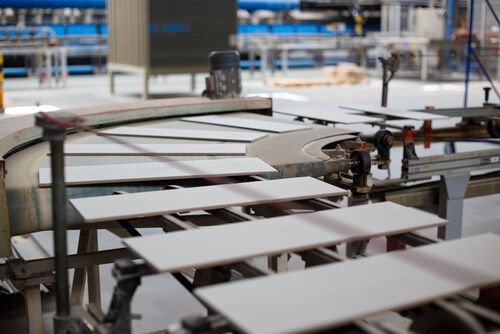
The ceramic tiles market in India has been growing significantly in recent years, driven by increasing demand for robust and aesthetically pleasing flooring options in both residential and commercial sectors. The market is expected to continue this upward trend in 2023, with a noticeable rise in the demand for premium, high-quality ceramic tiles in the country.
This blog provides a comprehensive overview of the ceramic tiles market in India, which includes its market size, driving forces behind growth, leading players, and future outlook.
Market Size And Growth Drivers
The ceramic tiles market in India is one of the largest in the world and has been growing at a substantial rate in recent years, because for a number of reasons such as increasing urbanisation, rising disposable incomes, and growing awareness about the benefits of high-quality ceramic tiles.
Ceramic tiles are popular as a flooring material due to their longevity, low maintenance requirements, and resistance to moisture and stains. Furthermore, these tiles are available in a diverse range of designs, sizes, and colours, making them ideal for a wide range of indoor and outdoor applications.
Another contributing factor to the growth of ceramic tiles in India is the increasing investment in the construction industry by both the government as well as private entities. With the growth of the real estate sector and the government's push towards infrastructure development, there has been a significant rise in construction projects in the country. This has led to an increase in demand for building materials, including ceramic tiles.
The growth of the middle-class population in India and their increasing purchasing power is also driving demand for ceramic tiles. Consumers are becoming more aware of the benefits of ceramic tiles and are willing to invest in high-quality, long-lasting flooring materials.
Additionally, the rising demand for eco-friendly building materials is also fueling growth in the Indian ceramic tiles market. Ceramic tiles are created from natural ingredients like clay and feldspar and are fully recyclable, making them a more sustainable choice compared to other building materials like carpet, hardwood, and laminate.
Moreover, advancements in technology and manufacturing processes have made ceramic tiles more accessible and affordable, making them a more viable option for a larger consumer base. This, in turn, has contributed to the growth of the Indian ceramic tiles market.
Key Players In The Market
The Indian ceramic tiles market is highly competitive, with a large number of manufacturers, wholesalers, and retailers operating in the industry. Some of the leading ceramic tiles manufacturers include Kajaria Ceramics, Somany Ceramics, Johnson Tiles, Hindware, Nitco and RAK ceramics. These companies have a significant market share and a wide range of products available in different designs, sizes, and colours.
Wholesalers and distributors play a crucial role in the distribution of ceramic tiles in India. They purchase products from manufacturers in bulk and sell them to retailers, contractors, and builders. Some of the well-known wholesalers in the Indian ceramic tiles market include AGL Tiles, Cera Sanitaryware, and others.
Retailers such as tile showrooms, building material stores, and online platforms are the final point of sale for ceramic tiles in India. They sell tiles to end-users, who are typically homeowners, contractors, and builders. Some of the popular retail chains in the Indian ceramic tiles market include Hindware Homes, Parryware, and others.
The major players have traditionally dominated the market share, however, advancements in technology, product innovation, and increased market opportunities have enabled other mid-sized companies to increase their market presence and secure new contracts and tap into new markets.
Ijaro Ceramic is one such tile company. Based in Morbi, India, the ceramics capital of India, Ijaro has been able to effectively leverage technology, innovate, and provide high-quality products and services and hence is best positioned to succeed in this highly competitive market. With 8 in-house manufacturing units, Ijaro Ceramics is not only a domestic brand, it has a fast-moving global presence and currently exports ceramics tiles and other products to over 40+ countries.
Additionally, Ijaro effectively responds to changing customer needs and preferences, such as the growing demand for eco-friendly and sustainable products. We ensure high-quality products, price flexibility to cater to all segments of the customer base, innovative and elegant designs, safe and secure packaging and robust customer support. You can check out our diverse tiles product collection to fulfil all your ceramic tile needs.
Future Trends In The Market
The ceramic tiles India market is expected to continue its growth trajectory in the coming years, due to increasing demand for durable and visually appealing flooring options in both residential and commercial industries. Additionally, the market is expected to benefit from growing demand for eco-friendly building materials and increased investment in the construction sector.
One of the major trends in the Indian ceramic tiles market is the increasing use of digital technologies for product design and marketing by tile companies. Many tile manufacturers and tile suppliers are now using digital tools such as 3D rendering and augmented reality to showcase their products to customers, making it easier for them to visualise how the tiles will look in their homes or businesses.
Another trend in the Indian ceramic tiles market is the increasing demand for custom-made tiles. Customers are now looking for unique and personalised tile designs that reflect their individual styles and taste. This has led to an increase in demand for custom-made tiles, which are made to order based on specific customer requirements.
To sum it up, for manufacturers, wholesalers, and retailers operating in the Indian ceramic tiles market, the key to success will be a focus on quality, innovation, and customer service. Companies that invest in research and development, invest in digital technologies and prioritise customer satisfaction will be best positioned to succeed in this growing and competitive market.

